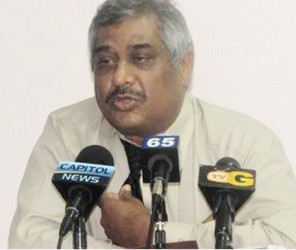The Guyana Revenue Autho-rity (GRA) has said that the professionals it identified in a recent notice are not the only ones compliant with the Tax Act.
The GRA clarification in the name of Commissioner-General Khurshid Sattaur comes in wake of a Kaieteur News report, headlined “Only 17 lawyers in Guyana authorized to charge fees” and published in its Sunday September 29, 2013 edition, which suggested that those professionals not named in the notice were in breach of the Tax Act of Guyana and were without a valid Profes-sional Practice Certificate.
The professionals listed in the notice comprised the latest batch who were issued with Tax Practice Certificates as recent as September 15, the GRA explained in a statement issued yesterday, while contending that the newspaper’s “contemptuous deduction” that because a particular professional’s name did not appear on the list that that person did not pay their tax was “even more outrageous and erroneous.”

“The GRA is appalled at the manipulative use of its notice by this newspaper to contrive an inglorious article for its own ends,” it said. “While payment of tax and filing of returns are part of the criteria to obtain a Tax Practice Certificate, one should not make such an assumption, since persons must make an application; and there are a number of reasons why they may not do so,” it added, while explaining that professionals were simply being given a warning not to be found in breach of the Act and encouraged to comply as those whose names were published.
The Authority labelled the article “misleading and mischievous” and further accused the newspaper of seeking to do more harm with its publication of “a distorted apology” rather than taking responsibility for the humiliation it caused. “The GRA offers its sincerest apologies to all compliant professionals for any inconvenience or embarrassment caused by the misleading report,” it said.
The GRA noted that it is an offence under Sub-Section 9 (a) of Section 39 of the Tax Act for any person to practise his/her profession privately for reward without a certificate of practice. Further, it said the Commissioner– General is required by the Act to publish in the official gazette on March 15 and July 1 of each year, a notice containing the names of all persons to whom certificates were issued for the year. Additional names would be posted as soon as practicable thereafter, it added.
According to the GRA, the first publications of the list of professionals who were issued with Tax Practice Certificates were done on March 16 and March 23, 2013, in the Official Gazette as required by law.
It said that as set out in the First Schedule of the Tax Act, professionals, including lawyers, doctors, engineers, accountants, and architects who are engaged in practice for reward, privately or independently of the state, are required to have a tax practice certificate. It added that professionals who may be in the employ of the state or other business organisations and who practice privately for reward are required to apply for a practice certificate.
However, professional persons employed by the state and who do not in any way engage in private practice are exempt, it noted. Additionally, it explained that any person who practices as a professional in the course of being wholly employed in the service of another person whose undertaking or business does not comprise the rendering of services of the nature of such practice would not be required to have a certificate. “…For example, a medical doctor employed solely by a mining company, an accountant employed solely by an engineering firm or an Attorney at Law employed solely by an insurance firm,” it explained.
The GRA said the annual fee which is due on January 1st of every year and payable on or before February 28th of the same year is as follows: Category ‘A’ Professionals (this group comprises: Accountants, Auditors, Legal Practitioners, Medical Prac-titioners, Architects, Dentists and Optometrists) – $250,000; Category ‘B’ Professionals (Engineers and Veterinary Surgeons) – $150,000; and Category ‘C’ Professionals (Physiotherapists, Pharma-cists and Surveyors) – $75,000.
The GRA pointed out that some professionals within category ‘A’ have challenged the applicable fee and as a result the Fiscal Enactment (Amendment) Act # 15 of 2003 as it relates to the fee of Practice Certificate for legal practitioners and medical practitioners is presently held in abeyance by a Court Order. It added that these professionals are still required to apply for
Professional Practice Certificates and pay a fee of $10,000 per annum, while all other professionals are required to pay the increased fee.
The GRA also maintained that while it is not a licensing authority in Guyana for any profession, it does have authority to administer the law regarding Tax Practice Certificate.




